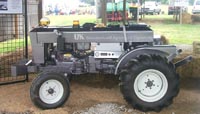Engineers at UK College of Agriculture Developing Driverless Tractor
Engineers at UK College of Agriculture Developing Driverless Tractor

Visitors at the recent University of Kentucky College of Agriculture’s 2002 Field Day did a few double takes when they saw the small tractor with no place for a driver.
The driverless tractor is being developed by agricultural engineers in the College of Agriculture’s biosystems and agricultural engineering department.
“It is based on a small utility tractor frame but we took all the human controls off of it and it will be a completely autonomous tractor,” said Tim Stombaugh, UK agriculture engineer. “It has a lot of computer controls but the interesting thing we are doing is a distributed control with a data network. That allows them to build a modular unit that does not have a lot of expense to it.
“It has little controllers that control each function on the machine and they talk to each other through a computer network,” he said. “These little components are fairly inexpensive. That is our final goal – to have a system without a lot of expense.”
A global positioning system is used to guide the tractor.
“Our concept is to instead of having one big tractor out there doing all the work, we will have several of these smaller tractors,” Stombaugh said. “There’s less soil compaction plus if you have a failure, then you take one of your machines out of service and you are still doing your operation so you aren’t losing as much time.”
Engineers are in the process of developing the control nodes and the
communication system between them. One node, for example would control the steering, another one the transmission, and another would control implements. Nodes can continue to be added of each of the different functions the machine will be asked to perform.
“Within a year we should have something that we’ll be demonstrating and doing some field work with,” Stombaugh said. “I think this technology is inevitable considering we are not the only ones working on this kind of technology.”
Other universities and organizations are working on this type of system, including some of the large tractor manufacturing companies.
“I think probably within four or five years this technology will be commercially available,” he said.
The GPS system UK is placing on its tractor has an accuracy rate of about one inch. So, seed, fertilizer and other crop inputs can be applied at very accurate rates using this technology.
But a driverless tractor will not replace the farmer. It just changes the farmer's function. The farmer will still have to monitor these tractors in the fields to make sure they are doing what they are supposed to do, and keep them filled with seed or fertilizer or whatever else is needed to keep the system going.